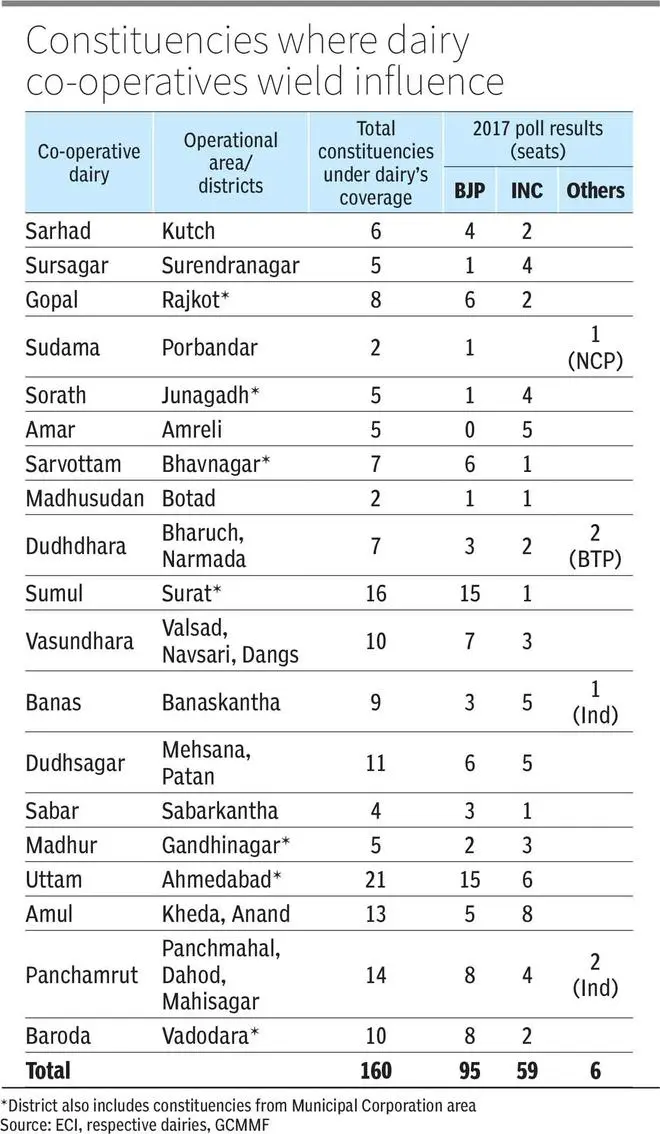A stable livelihood under the Amul model coupled with an increased income over the past five years is a big pro-incumbency factor for over 36 lakh dairy producers, whose vote will decide the outcome in at least 88 seats out of the Municipal corporation areas in Gujarat polls.
Dairy leaders believe that notwithstanding the issues of high cattle-feed prices and the deadly viral infection of Lumpy Skin Disease, the dairy producers across 33 districts of Gujarat are set to give a verdict favourable to the ruling Bhartiya Janata Party (BJP), unlike in 2017. Out of the 88 seats under cooperative dairies’ influence, BJP had scored only 42, while Congress got 40 and 6 went to others including independents during the last polls.

For example, in Amreli district in Saurashtra, Congress won all five seats in 2017 polls, but dairy leaders expect a reversal this time. “It was a strong Patidar factor against the government that overrode all other considerations then. This time, there is no such factor. On the contrary, dairy producers have benefitted from increased incomes due to dairy cooperatives. This will benefit the BJP,” Ashvinbhai Savaliya, Chairman of Amar dairy (Amreli District Cooperative Milk Union) told businessline.
Related Stories
Gujarat elections: How did the State economy fare over the last 5 years
Its well-developed ports and highways and industry-friendly reforms have put the State at the forefront of industrialisation‘Multi-fold growth’
In the southernmost district of Valsad, dairy producers have received an annual bonus of ₹700 crore for 2021-22. This is over-and-above the high milk procurement price of about ₹800 per kilo of fat. “Our dairy producers are mostly tribals. The dairy industry has grown multi-fold in the past few years, which has brought visible change in the lives of these tribal communities. There is no anti-incumbency this time, rather a strong pro-incumbency is what we can sense,” said Gamanbhai Patel, chairman of Vasudhara cooperative dairy of Valsad District, that covers two other tribal districts of Tapi and Dangs. It has over 1.26 lakh members with daily procurement of 9 lakh litres. In 2017, BJP had won 7 out of 10 seats in these districts.
Saurashtra and south Gujarat regions will vote in the first phase on December 1.
Related Stories
Gujarat polls: In communally-sensitive Godhra, AIMIM seeks to cement gains it made in 2021 civic elections
Godhra is one of the 14 seats which the AIMIM is contesting in the next month's elections to the 182-member AssemblyThe largest dairy concentration is in North Gujarat, where Banaskantha, Sabarkantha and Mehsana district dairy unions collectively have over 16 lakh members with milk procurement of about 145 lakh litres per day. The incomes generated by the three district unions exceed ₹28,000 crore annually. The milk procurement prices have increased in the range of 18-30 per cent during the past five years from about ₹650/kg fat in November 2017 to ₹860/kg fat now across different unions.

In 2017 polls, the three districts had a contest between BJP (11 seats), Congress (8 seats) and a Congress-supported independent on the 20 seats across the three districts. Congress is raising price rise and LSD issues to dent to BJP’s prospects.
Related Stories
Gujarat polls: How has the State fared in health, education and socioeconomic factors in the last five years?
Data points from the National Family Health Surveys 4 and 5 suggest that the State has shown good improvement in health and socio-economic parameters, but there is still room for improvementHowever, in the milk capital of India — Anand and Kaira districts — BJP could manage only five out of 13 seats in 2017. The poll outcome this time will be something to watch out for in these districts, where Congress has retained its stronghold for the past two elections. Central and north Gujarat regions will vote on December 5. The counting will take place on December 8.
On the other hand, the districts with high urban populations such as Ahmedabad, Vadodara, Surat, Rajkot, Bhavnagar have shown BJP having advantage compared with the situation in 2017, but cooperative leaders attribute that more to committed urban voters of the saffron party than the influence of dairy producers.




Comments
Comments have to be in English, and in full sentences. They cannot be abusive or personal. Please abide by our community guidelines for posting your comments.
We have migrated to a new commenting platform. If you are already a registered user of TheHindu Businessline and logged in, you may continue to engage with our articles. If you do not have an account please register and login to post comments. Users can access their older comments by logging into their accounts on Vuukle.